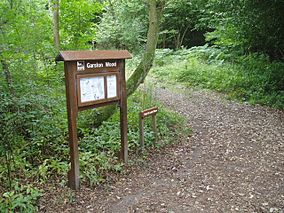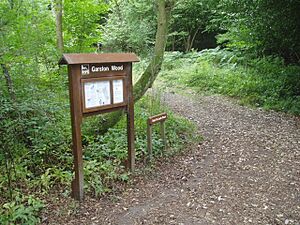Garston Wood facts for kids
Quick facts for kids Garston Wood |
|
|---|---|
|
IUCN Category IV (Habitat/Species Management Area)
|
|

Information board in Garston Wood
|
|
| Location | Deanland, Sixpenny Handley, Dorset, England |
| Area | 34 hectares (84 acres) |
| Established | 1985 |
| Governing body | RSPB |
| Website | RSPB Garston Wood |
Garston Wood is a special forest area, like a nature reserve. It's about 34 hectares (that's like 84 football fields!) and sits on the edge of Dorset and Wiltshire in England. The Royal Society for the Protection of Birds (RSPB) owns and looks after it. Their main goal is to protect the amazing plants and animals that live there.
This wood has very old trees and areas where smaller trees are carefully managed. The RSPB even helps birds by setting goals for how many can nest there each year. They also clear out some trees to keep the forest healthy. The RSPB wants everyone to enjoy Garston Wood. They have fun events every year and groups of volunteers who help out. You can also find a map and guide to the trails.
Contents
Amazing Animals of Garston Wood
Garston Wood is home to many different animals. It's a great place to spot birds, butterflies, and even deer!
Birds
Many kinds of birds love to visit Garston Wood. If you enjoy watching birds, you might see:
Butterflies
Garston Wood is also a fantastic spot for butterflies. Look out for these colorful insects fluttering around:
- Speckled wood
- Silver-washed fritillary
- Meadow brown
- Small white
- Ringlet
- Brimstone
- Peacock
- Gatekeeper
- Comma
Deer
You might even spot some deer in Garston Wood! There are five different types of deer living here, including the fallow deer.
Wonderful Plants of Garston Wood
Garston Wood is full of beautiful and interesting plants.
Wildflowers and Orchids
Many types of orchids grow well in Garston Wood. You can also find other lovely wildflowers like:
- Lesser celandine
- Butcher's broom
- Wood anemone
- Dog violet
- Primrose
- Wild garlic
- The rare toothwort
- Bluebells
Trees
The forest has many different trees. Some common ones include:
- Oak
- Beech
- Hazel (which is carefully cut back to help it grow)
- A type of ash tree that is currently facing a disease called forest dieback.
Visiting Garston Wood
Garston Wood is open to the public, and it's free to visit!
There's a car park run by the RSPB near the top right corner of the wood. You can find helpful leaflets there with information and a map of the trails. If you bring your dog, please keep them on a leash and only on the public footpaths and bridleways. This helps protect the wildlife.
 | Kyle Baker |
 | Joseph Yoakum |
 | Laura Wheeler Waring |
 | Henry Ossawa Tanner |


